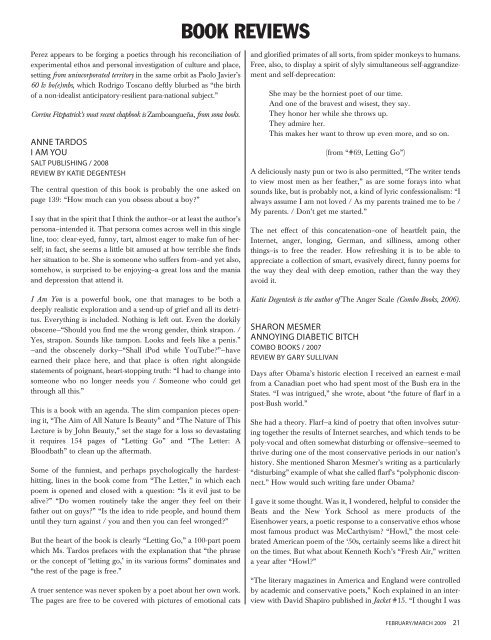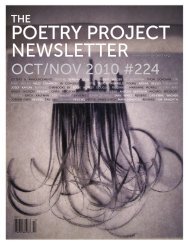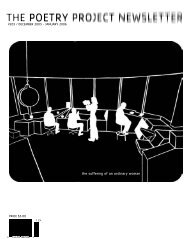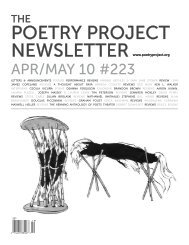BOOK REVIEWSIrony/genuine emotion, flat affect/overwrought diction, and strictreportage/fantastical projections blur together, keep the reader offcenter and make it impossible to differentiate. <strong>The</strong> end result ofthis convoluted ride is a sort of 3-D appropriation of life as itreally (or might really) be, delineated by an overwhelming arrayof feints and ripostes.Inseparable also includes a strong assortment of shorter works.Some are touching, fairly straightforward meditations on the passageof time, including “For Ten Years,” which talks about Warshwaiting to pick up his children after school:<strong>The</strong>re’s my ghost leaning against a car waiting /for my kids. / <strong>The</strong>re’s the teacher waving to me atthe entrance / to the school. She’s tall & looks likea statue / in a painting by Vermeer . . . Memoriescast long shadows, branching out / across brokenpavement. Memories / cast shadows like obelisks& antennae.Others are a curious mix of breathless, journalistic chatter; overthe-topromanticism; and hard-bitten punch line, as in the poem“Montgomery Clift”:...something died in our hearts & we went on living,part of the body of people who inhabit the largest ofcities, the so-called cosmopolitan centers, where thephotograph of a model on the front of a glossymagazine can influence the way millions of peoplecut their hair...All my life all I’ve ever wanted to dowas enter someone else’s being. It’s only by sacrificingyour whole being that you can prove your loveto someone, I know that’s true. But now that I’vepassed the test what can I do for an encore?I wouldn’t want to say Inseparable is a summation; Warsh is energeticand unpredictable–in the future he might cast off in anentirely new direction. But it’s certainly safe to say that this bookis rich, mercurial, and accomplished. It demands–and rewards–areader’s attention.Peter Bushyeager is the author of Citadel Luncheonette, a collection ofpoems published by Ten Pell. He’s taking advantage of his free time tothink and work in secret.Craig Santos Perezfrom Unincorporated Territory [hacha]Tinfish Press / 2008Review by Corrine Fitzpatrickfrom unincorporated territory is the first full-length book by AchiotePress editor Craig Santos Perez. A native Chamoru from Guam,Perez investigates the malleability versus specificities of the island’soverlapped histories as imperialized colony, U.S. military base andpersonal homeland. <strong>The</strong> book is comprised of a preface by theauthor, occasional graphics, and seven shuffled subsections ofpoetry, each distinct in form and content-thread. Ranging fromWorld War II to the achiote plant, the details of the poems eachunderscore Guam’s historical adaption of non-native elements intoits culture, language, and ecosystem. That heritage of incorporation ispainstakingly reenacted – on the level of the poem – as Perezsplices English with Chamorro and shifts register from poetic toethnographic throughout the book.Palimpsest provides a dynamic metaphor for Guam’s colonizedpast, as well as a basis to look at the actual writing here. Not freeverse, but hardly a case of subject being siphoned through a hackneyedset of forms, Perez seems to have utilized poetry as his modeof research. His “history-poesy” invokes Ed Sanders’ Investigative<strong>Poetry</strong>: “To surround an item of time with thick vector-clusters ofGnosis, to weave a corona of perception through verse.” While Ithink that poetry as a means of expressing history is here, for themost part, mutually beneficial, at times Perez’s expression of intentionis heavy-handed, as to sap dry his poems’ vibrancy-potential inthe service of ensuring their academically post-colonial function.Postulates aside, many pleasing recombinant affinities appear. Perezacknowledges his eclectic influences in epigraphic shout-outs wovenbetween the sections (Cha; Celan; Stein; Césaire; Olson; McKay;Shurin; Duncan; Lorca; Vicuña; Oppen). <strong>The</strong> most notable comparisonis to Cecilia Vicuña’s etymological transliterations. Lessconcerned with sonic potentialities, perhaps, but similar in hisengagement with the opening up of isolated words – Perez’s miningof Chamorro as route to cultural root seems deeply aligned withVicuña’s lifelong excavation of Quechua and Spanish languages. Inthe section, “from Tidelands,” he writes:“if / fires”-strangle this “forced tongue” let / windshieldthe culled-remains as [langet]- / as arrangement“of opening / language / among common” debris.<strong>The</strong> page ends with one of the many translation keys found throughoutthe book [langet : sky, heaven]. His keys function as clues, or code,which make the act of reading a satisfyingly transparent assemblage.At least half of the book’s poems are marked by isolated Chamorrounits, which become stents in the arteries of incised Englishlanguagelines.Perez’s slightly abstracted graphics – of Spanish galleon routes,wars of the Pacific, and international commercial flight paths –allude to his seemingly open-field poetic sensibility while actuallyhugging closer to a practical function of information display. <strong>The</strong>sevisuals are reminiscent of Mark Lombardi’s intricate NarrativeStructures drawings in their succinct collusion of data and aesthetic.<strong>The</strong> rendering of flight paths — with Guam centralized as thePacific hub to Asia – is particularly interesting in that the staticsignifiers of airport acronyms function as particles of sound andmeaning in a poetic sense, while literally referring to the island’simportant geographical role in the global travel nexus. It is herethat Perez’s use of palimpsest as extended metaphor and basis forpoetic form succeeds most completely.20 february/march 2009
Perez appears to be forging a poetics through his reconciliation ofexperimental ethos and personal investigation of culture and place,setting from unincorporated territory in the same orbit as Paolo Javier’s60 lv bo(e)mbs, which Rodrigo Toscano deftly blurbed as “the birthof a non-idealist anticipatory-resilient para-national subject.”Corrine Fitzpatrick’s most recent chapbook is Zamboangueña, from sona books.ANNE TARDOSI AM YOUSalt Publishing / 2008Review by Katie Degentesh<strong>The</strong> central question of this book is probably the one asked onpage 139: “How much can you obsess about a boy?”I say that in the spirit that I think the author–or at least the author’spersona–intended it. That persona comes across well in this singleline, too: clear-eyed, funny, tart, almost eager to make fun of herself;in fact, she seems a little bit amused at how terrible she findsher situation to be. She is someone who suffers from–and yet also,somehow, is surprised to be enjoying–a great loss and the maniaand depression that attend it.BOOK REVIEWSand glorified primates of all sorts, from spider monkeys to humans.Free, also, to display a spirit of slyly simultaneous self-aggrandizementand self-deprecation:She may be the horniest poet of our time.And one of the bravest and wisest, they say.<strong>The</strong>y honor her while she throws up.<strong>The</strong>y admire her.This makes her want to throw up even more, and so on.(from “#69, Letting Go”)A deliciously nasty pun or two is also permitted, “<strong>The</strong> writer tendsto view most men as her feather,” as are some forays into whatsounds like, but is probably not, a kind of lyric confessionalism: “Ialways assume I am not loved / As my parents trained me to be /My parents. / Don’t get me started.”<strong>The</strong> net effect of this concatenation–one of heartfelt pain, theInternet, anger, longing, German, and silliness, among otherthings–is to free the reader. How refreshing it is to be able toappreciate a collection of smart, evasively direct, funny poems forthe way they deal with deep emotion, rather than the way theyavoid it.I Am You is a powerful book, one that manages to be both adeeply realistic exploration and a send-up of grief and all its detritus.Everything is included. Nothing is left out. Even the dorkilyobscene—“Should you find me the wrong gender, think strapon. /Yes, strapon. Sounds like tampon. Looks and feels like a penis.”—and the obscenely dorky—“Shall iPod while YouTube?”—haveearned their place here, and that place is often right alongsidestatements of poignant, heart-stopping truth: “I had to change intosomeone who no longer needs you / Someone who could getthrough all this.”This is a book with an agenda. <strong>The</strong> slim companion pieces openingit, “<strong>The</strong> Aim of All Nature Is Beauty” and “<strong>The</strong> Nature of ThisLecture is by John Beauty,” set the stage for a loss so devastatingit requires 154 pages of “Letting Go” and “<strong>The</strong> Letter: ABloodbath” to clean up the aftermath.Some of the funniest, and perhaps psychologically the hardesthitting,lines in the book come from “<strong>The</strong> Letter,” in which eachpoem is opened and closed with a question: “Is it evil just to bealive?” “Do women routinely take the anger they feel on theirfather out on guys?” “Is the idea to ride people, and hound themuntil they turn against / you and then you can feel wronged?”But the heart of the book is clearly “Letting Go,” a 100-part poemwhich Ms. Tardos prefaces with the explanation that “the phraseor the concept of ‘letting go,’ in its various forms” dominates and“the rest of the page is free.”A truer sentence was never spoken by a poet about her own work.<strong>The</strong> pages are free to be covered with pictures of emotional catsKatie Degentesh is the author of <strong>The</strong> Anger Scale (Combo Books, 2006).SHARON MESMERANNOYING DIABETIC BITCHCOMBO BOOKS / 2007Review by GARY SULLIVANDays after Obama’s historic election I received an earnest e-mailfrom a Canadian poet who had spent most of the Bush era in theStates. “I was intrigued,” she wrote, about “the future of flarf in apost-Bush world.”She had a theory. Flarf—a kind of poetry that often involves suturingtogether the results of Internet searches, and which tends to bepoly-vocal and often somewhat disturbing or offensive—seemed tothrive during one of the most conservative periods in our nation’shistory. She mentioned Sharon Mesmer’s writing as a particularly“disturbing” example of what she called flarf’s “polyphonic disconnect.”How would such writing fare under Obama?I gave it some thought. Was it, I wondered, helpful to consider theBeats and the New York School as mere products of theEisenhower years, a poetic response to a conservative ethos whosemost famous product was McCarthyism? “Howl,” the most celebratedAmerican poem of the ‘50s, certainly seems like a direct hiton the times. But what about Kenneth Koch’s “Fresh Air,” writtena year after “Howl?”“<strong>The</strong> literary magazines in America and England were controlledby academic and conservative poets,” Koch explained in an interviewwith David Shapiro published in Jacket #15. “I thought I wasfebruary/march 2009 21
















